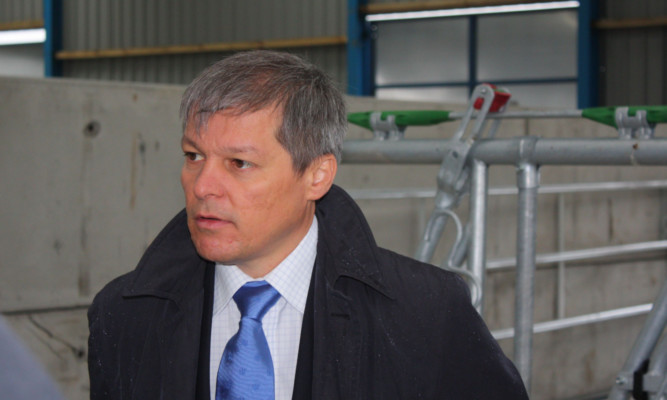The European Commission has given the green light to emergency dairy sector support measures in the face of the Russian EU trade ban.
Following meetings last week to flesh out aid for peaches, nectarines and perishable soft fruits and vegetables, the commission confirmed it would be assisting dairy producers with an open Private Storage Aid specifically targeted at softening the blow to butter, skimmed milk powder (SMP) and certain cheese export markets.
According to Dacian Ciolos, the EU Agriculture and Rural Development commissioner, the support is being implemented because price signals on the EU diary market have already shown the impact of the Russian trade ban.
The support scheme will provide producers with an alternative to selling products off at low prices and should help to prevent any disruption to local markets.
Mr Ciolos said: “In a number of member states export earnings are being lost and new outlets need to be found.”
He said the European dairy sector needs “time and help to adapt” and targeted market support should help to breach that gap.
“If needed, further measures will follow,” he added.
The commissioner said his message to EU producers remains clear: “Where material risks of market destabilisation appear, I will continue to use the new CAP to act pre-emptively to stabilise the market.”
As part of the measures, Mr Ciolos said the commission will provide Private Storage Aid for butter and SMP to cover the daily costs of storing these products for a period of three to seven months.
Given the value of EU exports to Russia in relation to certain cheeses, carrying an estimated worth of close to e1 billion last year, the commission intends to extend this support measure to include certain cheeses.
“The rules on PSA for cheese and the extension of the intervention period will be regulated by a Delegated Act which the commission will table in the near future under the emergency market rules established in last year’s CAP reform,” said Mr Ciolos.
Responding to the announcement, Dr Judith Bryans, chief executive of Dairy UK, said the key measure will play an important role in helping to prevent any “oversupply” in Europe.
She said it will also give producers the breathing space, in the short term, to find alternative markets for dairy produce and give the global dairy market time “to adapt to recent developments and absorb the impact of the ban”.
Dr Bryans said Dairy UK intends to “strongly argue” for the need to include cheddar in any PSA measures.
“Cheddar is one of the most widely internationally traded cheeses and its exclusion from PSA would be detrimental to the UK dairy industry,” she said.
“We will be lobbying the commission to argue for such an extension.”
She added: “We will continue monitoring the situation and keep working closely with Defra, the European Dairy Association and other stakeholders to mitigate the impact of the Russian ban.”
The impact of Russia’s food import ban has already proved particularly evident in Finland where Valio, the country’s biggest dairy producer, claims it stands to lose e240m in exports.
Last year, EU dairy exports to Russia totalled a combined worth of e2.3bn.
